In this week’s column we review more of the trade books published in 2018 that tell “her stories,” stories about the achievements of female visionaries, creative thinkers, innovators, activists, and doers in the past and the present. These stories need to be heard and read today and will inspire young people to dare to dream big.
Ages 4–8
Hidden Figures: The True Story of Four Black Women and the Space Race. Margot Lee Shetterly (with Winifred Conkling). Ill. Laura Freeman. 2018. HarperCollins.
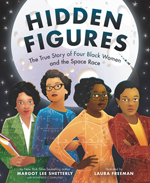 This informational picture book, inspired by Margot Lee Shetterly’s Hidden Figures: The American Dream and the Untold Story of the Black Women Mathematicians Who Helped Win the Space Race (William Morrow), tells the story of four black women who “were good at math. Really good.” These women were “hidden figures” who did the seemingly impossible, overcoming sexism and racism through determination, persistence, and hard work to make important contributions in the field of aeronautics and space exploration. Back matter includes a timeline highlighting the dates when the four women started working as computers in the federal government’s aeronautics and space programs (during a time when mathematical computations were done by humans, not machines); a “Meet the Computers” section with biographies of Dorothy Johnson Vaughan (1910–2008), Mary Winston Jackson (1921–2005), Katherine Coleman Goble Johnson (1918–present), and Dr. Christine Mann Darden (1942–present); a glossary; and an author’s note in which Shetterly shares her hope that Hidden Figures will inspire readers “to ride their dreams as high as their talent and determination will take them.”
This informational picture book, inspired by Margot Lee Shetterly’s Hidden Figures: The American Dream and the Untold Story of the Black Women Mathematicians Who Helped Win the Space Race (William Morrow), tells the story of four black women who “were good at math. Really good.” These women were “hidden figures” who did the seemingly impossible, overcoming sexism and racism through determination, persistence, and hard work to make important contributions in the field of aeronautics and space exploration. Back matter includes a timeline highlighting the dates when the four women started working as computers in the federal government’s aeronautics and space programs (during a time when mathematical computations were done by humans, not machines); a “Meet the Computers” section with biographies of Dorothy Johnson Vaughan (1910–2008), Mary Winston Jackson (1921–2005), Katherine Coleman Goble Johnson (1918–present), and Dr. Christine Mann Darden (1942–present); a glossary; and an author’s note in which Shetterly shares her hope that Hidden Figures will inspire readers “to ride their dreams as high as their talent and determination will take them.”
—CA
Spring After Spring: How Rachel Carson Inspired the Environmental Movement. Stephanie Roth Sisson. 2018. Roaring Brook.
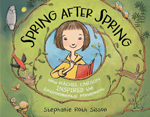 “Spring after spring, year after year,” Rachel Carson explored nature during her childhood. She wanted to be a writer until, during a college course, she became fascinated by the plants and animals she saw in a drop of water through a microscope and decided to study biology. She became an underwater researcher and wrote books about the sea. Then, always a careful observer, she started to notice that “all around, nature’s voices were going quiet” and began the research that led to the discovery that the chemicals being used to kill insects were harmful to humans and other animals. Her book Silent Spring (Houghton Mifflin) raised public awareness of the destruction of the environment by poisons such as DDT, led to the formation of the Environmental Protection Agency, and inspired the environmental movement. Stephanie Roth Sisson’s use of paneled, full-page, and double-page spreads of mixed-media artwork makes this biography of Rachel Carson (1907–1964) an inviting introduction for young readers to the important contributions made by this scientist, writer, and environmental activist. Back matter includes an author’s note, notes providing additional information related to specific pages of the book, a bibliography, and source notes.
“Spring after spring, year after year,” Rachel Carson explored nature during her childhood. She wanted to be a writer until, during a college course, she became fascinated by the plants and animals she saw in a drop of water through a microscope and decided to study biology. She became an underwater researcher and wrote books about the sea. Then, always a careful observer, she started to notice that “all around, nature’s voices were going quiet” and began the research that led to the discovery that the chemicals being used to kill insects were harmful to humans and other animals. Her book Silent Spring (Houghton Mifflin) raised public awareness of the destruction of the environment by poisons such as DDT, led to the formation of the Environmental Protection Agency, and inspired the environmental movement. Stephanie Roth Sisson’s use of paneled, full-page, and double-page spreads of mixed-media artwork makes this biography of Rachel Carson (1907–1964) an inviting introduction for young readers to the important contributions made by this scientist, writer, and environmental activist. Back matter includes an author’s note, notes providing additional information related to specific pages of the book, a bibliography, and source notes.
—CA
Turning Pages: My Life Story. Sonia Sotomayor. Ill. LuLu Delacre. 2018. Philomel/Penguin.
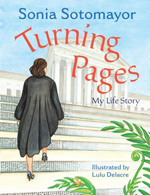 In this picture book autobiography, Sonia Sotomayor, the first Latina U.S. Supreme Court associate justice, encourages young readers to dream big. Although forced to deal with difficult challenges during her childhood such as learning English, experiencing the death of her father, and being diagnosed with childhood diabetes, she found courage and direction in words. The recurrent phrase “Books were . . .” threads itself throughout the text of Turning Pages, and LuLu Delacre’s artwork, created in mixed media with oil washes and collage elements, clearly shows how important books have been to Sotomayor throughout her life. The endpapers feature captioned photographs of Sotomayor’s childhood, family, and friends and milestones of her academic and professional life. Back matter includes a timeline of Sotomayor’s life from her birth in the Bronx (June 25, 1954) to her swearing in as the 111th Justice of the Supreme Court (August 8, 2009).
In this picture book autobiography, Sonia Sotomayor, the first Latina U.S. Supreme Court associate justice, encourages young readers to dream big. Although forced to deal with difficult challenges during her childhood such as learning English, experiencing the death of her father, and being diagnosed with childhood diabetes, she found courage and direction in words. The recurrent phrase “Books were . . .” threads itself throughout the text of Turning Pages, and LuLu Delacre’s artwork, created in mixed media with oil washes and collage elements, clearly shows how important books have been to Sotomayor throughout her life. The endpapers feature captioned photographs of Sotomayor’s childhood, family, and friends and milestones of her academic and professional life. Back matter includes a timeline of Sotomayor’s life from her birth in the Bronx (June 25, 1954) to her swearing in as the 111th Justice of the Supreme Court (August 8, 2009).
—NB
Ages 9–11
Little Dreamers: Visionary Women Around the World. Vashti Harrison. 2018. Little, Brown.
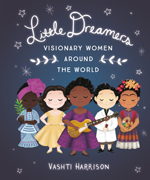 This collective biography is an inspiring celebration of 36 visionary women from around the world and throughout history. Double-page spreads pair a colorful, interest-catching portrait (done in Adobe Photoshop) with one page of text about the life and work of each trailblazer—from Fatima Al-Fihri, a ninth-century North African educational philanthropist who built Al Quaraouiyine, the oldest university in the world, to Maya Lin (1959), the sculptor and architect who designed the Vietnam Veterans Memorial in Washington, DC. A “More Little Dreamers” section includes biographical sketches of 18 other visionary women. Back matter includes a list of resources to learn more about these women, sources Harrison used in her research, a glossary, and acknowledgments.
This collective biography is an inspiring celebration of 36 visionary women from around the world and throughout history. Double-page spreads pair a colorful, interest-catching portrait (done in Adobe Photoshop) with one page of text about the life and work of each trailblazer—from Fatima Al-Fihri, a ninth-century North African educational philanthropist who built Al Quaraouiyine, the oldest university in the world, to Maya Lin (1959), the sculptor and architect who designed the Vietnam Veterans Memorial in Washington, DC. A “More Little Dreamers” section includes biographical sketches of 18 other visionary women. Back matter includes a list of resources to learn more about these women, sources Harrison used in her research, a glossary, and acknowledgments.
—CA
So Tall Within: Sojourner Truth’s Long Walk Toward Freedom. Gary D. Schmidt. Ill. Daniel Minter. 2018. Roaring Brook.
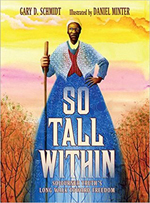 Sold into slavery as a child, Isabella continued to face hardship: a family ripped apart, betrayal by an owner who lied about setting her free, the kidnapping of her 5-year-old son (who was later returned to her, damaged for life), and other painful injustices. Daniel Minter’s beautifully composed and somber paintings, created in a predominately russet and blue palette, complement Gary D. Schmidt’s lyrical story that culminates in Isabella adopting the name Sojourner Truth and walking across America “to tell the truth about Slavery.” Weary upon her return home, she asks herself, “What is anybody in the world for?” and realizes “[I] had a work to do. My lost time . . . being a slave was made up.” Back matter includes a biographical note with additional information about Sojourner Truth, a bibliography, and artist’s notes in which Minter explains his use of a series of vertical paintings to introduce events in Sojourner Truth’s life.
Sold into slavery as a child, Isabella continued to face hardship: a family ripped apart, betrayal by an owner who lied about setting her free, the kidnapping of her 5-year-old son (who was later returned to her, damaged for life), and other painful injustices. Daniel Minter’s beautifully composed and somber paintings, created in a predominately russet and blue palette, complement Gary D. Schmidt’s lyrical story that culminates in Isabella adopting the name Sojourner Truth and walking across America “to tell the truth about Slavery.” Weary upon her return home, she asks herself, “What is anybody in the world for?” and realizes “[I] had a work to do. My lost time . . . being a slave was made up.” Back matter includes a biographical note with additional information about Sojourner Truth, a bibliography, and artist’s notes in which Minter explains his use of a series of vertical paintings to introduce events in Sojourner Truth’s life.
—NB
Ages 12–14
Girls Think of Everything: Stories of Ingenious Inventions by Women. Catherine Thimmesh. Ill. Melissa Sweet. 2018. Houghton Mifflin.
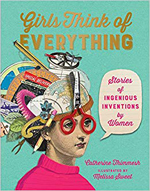 This new edition of Girls Think of Everything, originally published in 2000, has been revised and updated to include stories that spotlight the diversity of the female inventors and inventions related to the technological world we live in today. Following an introduction on women as inventors throughout history, short chapters with Catherine Thimmesh’s engaging narratives, complemented by Melissa Sweet’s clever mixed-media collage artwork, present 15 inventions and the creative thinkers behind them that range from the famous chocolate chip cookie accidentally created by Ruth Wakefield to the computer compiler invented by Grace Murray Hopper to the space bumper invented by Jeanne Lee Crews. Front and back endpapers present a time line of inventions by women from pre-1800s to the present. The final chapter, “Your Turn,” includes information on patenting inventions and contests and organization that will be of particular interest to aspiring young innovators. Back matter includes sources, a glossary, and an index.
This new edition of Girls Think of Everything, originally published in 2000, has been revised and updated to include stories that spotlight the diversity of the female inventors and inventions related to the technological world we live in today. Following an introduction on women as inventors throughout history, short chapters with Catherine Thimmesh’s engaging narratives, complemented by Melissa Sweet’s clever mixed-media collage artwork, present 15 inventions and the creative thinkers behind them that range from the famous chocolate chip cookie accidentally created by Ruth Wakefield to the computer compiler invented by Grace Murray Hopper to the space bumper invented by Jeanne Lee Crews. Front and back endpapers present a time line of inventions by women from pre-1800s to the present. The final chapter, “Your Turn,” includes information on patenting inventions and contests and organization that will be of particular interest to aspiring young innovators. Back matter includes sources, a glossary, and an index.
—NB
She Did It!: 21 Women Who Changed the Way We Think. Emily Arnold McCully. 2018. Hyperion.
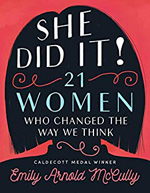 In this collective biography, Emily Arnold McCully profiles 21 women who have significantly influenced the way Americans think. The entries (arranged chronologically) feature a full-page portrait (rendered in pen-and-ink and watercolors) and one-page introduction, followed by extensive narrative on each woman’s life and accomplishments. The accessible and well-organized chapters include sidebars providing historical context, spot art, and a quotation. The diverse group of women begins with pioneer investigative journalist Ida Minerva Tarbell (1857–1944) and ends with Temple Grandin (1947–present), the scientist who changed perceptions of autism. A last section, “Second Wave Feminism,” covers the women’s liberation movement in the 1960s and 1970s. McCully ends with a timely, thought-provoking statement: “The Second Wave had made women’s rights human rights. A generation had awakened and fought for those rights. But sexism is ancient and persistent and must be beaten back again and again.” Back matter includes sources and an index.
In this collective biography, Emily Arnold McCully profiles 21 women who have significantly influenced the way Americans think. The entries (arranged chronologically) feature a full-page portrait (rendered in pen-and-ink and watercolors) and one-page introduction, followed by extensive narrative on each woman’s life and accomplishments. The accessible and well-organized chapters include sidebars providing historical context, spot art, and a quotation. The diverse group of women begins with pioneer investigative journalist Ida Minerva Tarbell (1857–1944) and ends with Temple Grandin (1947–present), the scientist who changed perceptions of autism. A last section, “Second Wave Feminism,” covers the women’s liberation movement in the 1960s and 1970s. McCully ends with a timely, thought-provoking statement: “The Second Wave had made women’s rights human rights. A generation had awakened and fought for those rights. But sexism is ancient and persistent and must be beaten back again and again.” Back matter includes sources and an index.
—CA
Ages 15+
Becoming. Michelle Obama. 2018. Crown/Random House.
 Michelle Robinson Obama—lawyer, writer, and wife of Barack Obama, 44th president of the United States—is the first African-American woman to serve as First Lady. Her memoir, which is divided into “Becoming Me,” “Becoming Us,” and “Becoming More,” begins with her growing up in a loving family in the South Side of Chicago and ends as she, her husband, and two daughters reenter civilian life after eight years (2009–2017) in the White House. Spending the majority of her adult life as an advocate within African-American and other communities for women’s rights in the workplace, for issues related to childhood obesity, for needs of military families, and for educating girls around the world, she celebrates the transformative power of “owning your unique story, in using your authentic voice. And there’s grace in being willing to know and hear others. This, for me, is how we become.” Endpaper photographs, a preface, and an epilogue complete this inspiring story of a woman who continues to empower us to work together for greater possibilities for all people.
Michelle Robinson Obama—lawyer, writer, and wife of Barack Obama, 44th president of the United States—is the first African-American woman to serve as First Lady. Her memoir, which is divided into “Becoming Me,” “Becoming Us,” and “Becoming More,” begins with her growing up in a loving family in the South Side of Chicago and ends as she, her husband, and two daughters reenter civilian life after eight years (2009–2017) in the White House. Spending the majority of her adult life as an advocate within African-American and other communities for women’s rights in the workplace, for issues related to childhood obesity, for needs of military families, and for educating girls around the world, she celebrates the transformative power of “owning your unique story, in using your authentic voice. And there’s grace in being willing to know and hear others. This, for me, is how we become.” Endpaper photographs, a preface, and an epilogue complete this inspiring story of a woman who continues to empower us to work together for greater possibilities for all people.
—NB
The Strange True Tale of Frankenstein’s Creator Mary Shelley. Catherine Reef. 2018. Clarion/Houghton Mifflin.
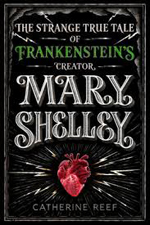 In 1797, Mary Shelley was born to feminist writer Mary Wollstonecraft, who died shortly after giving birth to her. Raised by William Godwin (her strict, atheist, bookseller, anti-establishment father), Mary met poet Percy Bysshe Shelley when he attended intellectual discussions with other up-and-coming young gentlemen, led by her father in their home. Falling in love, 16-year-old Mary married Percy. The couple fled and began a family, living an unconventional life as they traveled as free spirits from one place to another—and suffered tragedies along the way. Early on, beginning with a challenge to write a ghost story in a week, 18-year-old Mary created her soon-to-become-a-classic Frankenstein and, thus, began her career as an author. This fascinating biography is enlivened with an abundance of photographs, sketches, engravings, and documents. Back matter includes notes, a bibliography, a list of Mary Wollstonecraft Shelley’s published works, and an index.
In 1797, Mary Shelley was born to feminist writer Mary Wollstonecraft, who died shortly after giving birth to her. Raised by William Godwin (her strict, atheist, bookseller, anti-establishment father), Mary met poet Percy Bysshe Shelley when he attended intellectual discussions with other up-and-coming young gentlemen, led by her father in their home. Falling in love, 16-year-old Mary married Percy. The couple fled and began a family, living an unconventional life as they traveled as free spirits from one place to another—and suffered tragedies along the way. Early on, beginning with a challenge to write a ghost story in a week, 18-year-old Mary created her soon-to-become-a-classic Frankenstein and, thus, began her career as an author. This fascinating biography is enlivened with an abundance of photographs, sketches, engravings, and documents. Back matter includes notes, a bibliography, a list of Mary Wollstonecraft Shelley’s published works, and an index.
—NB
Nancy Brashear is Professor Emeritus of English, Azusa Pacific University, in Azusa, California. Carolyn Angus is former director of the George G. Stone Center for Children's Books, Claremont Graduate University, in Claremont, California.